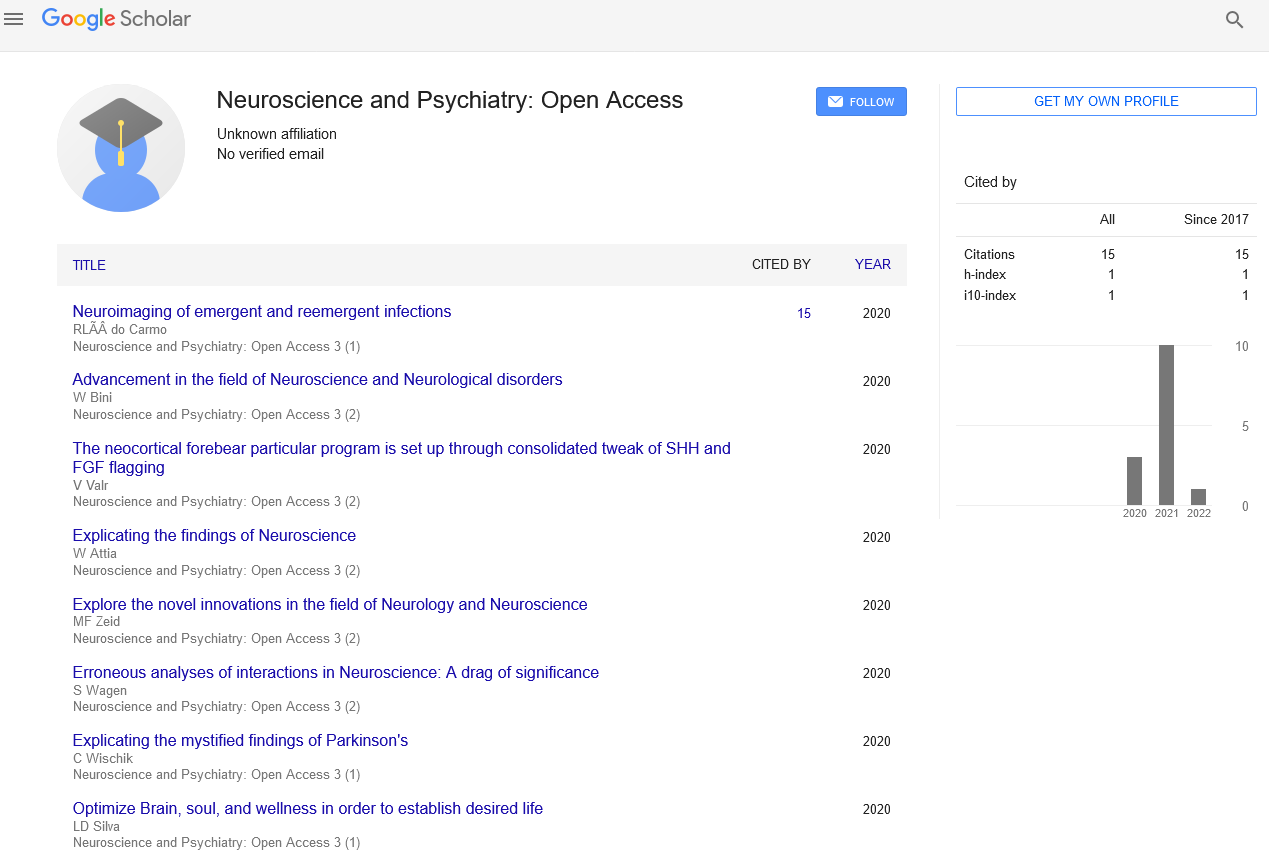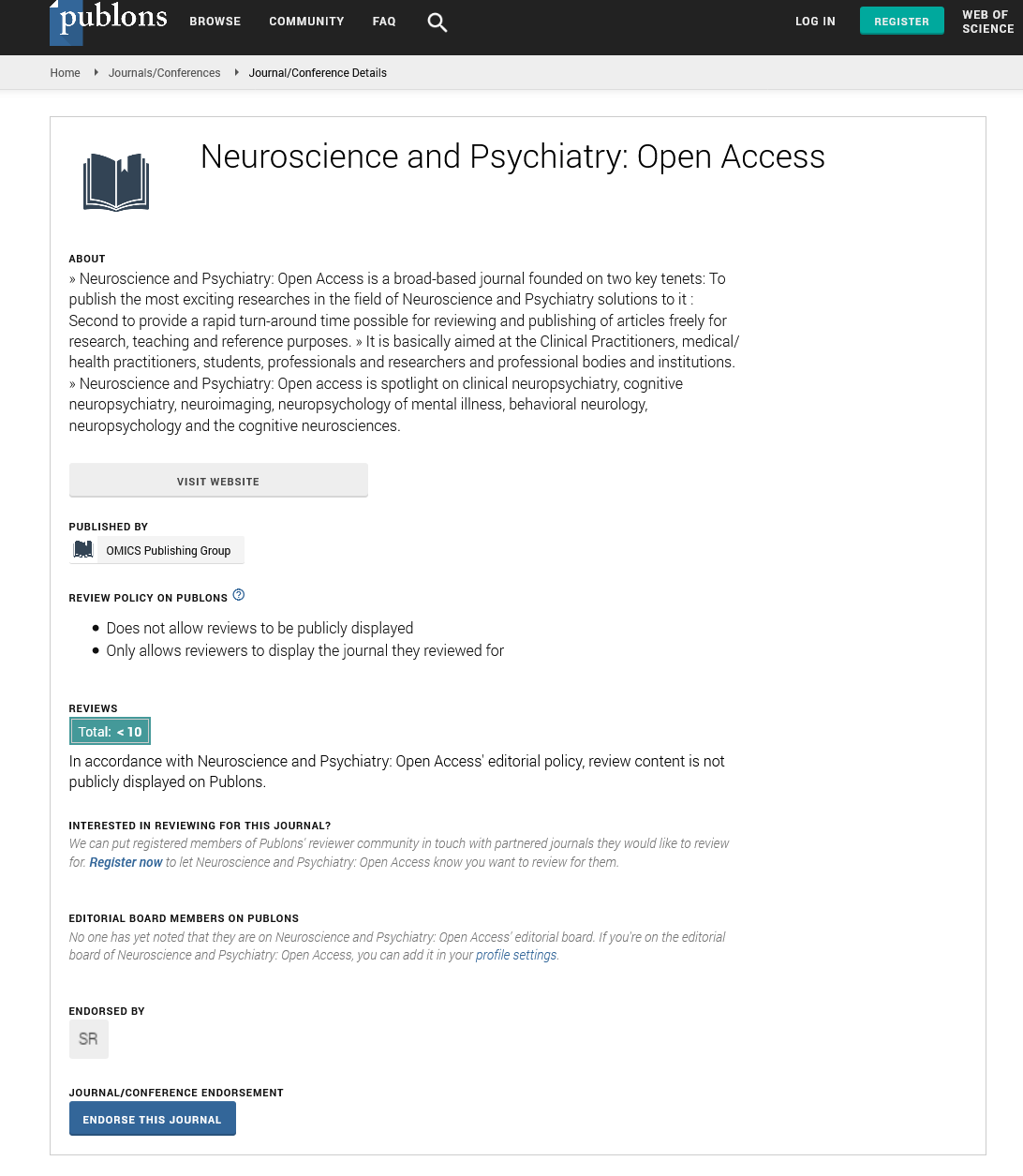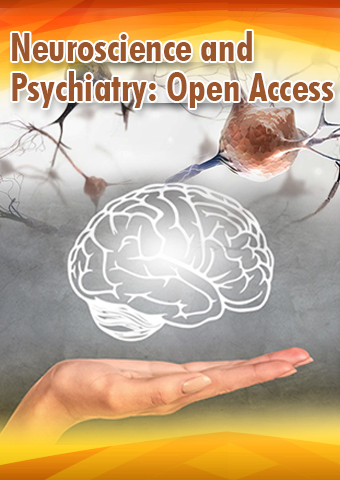Perspective - Neuroscience and Psychiatry: Open Access (2024) Volume 7, Issue 1
Nutrition in Psychiatry: Exploring the Mind-Body Connection
- Corresponding Author:
- Eirini Alexiou
Department of Clinical Neuroscience, Karolinska Institutet, Stockholm, Sweden
E-mail: eirini@vgregion.se
Received: 02-01-2024, Manuscript No. NPOA-23-119207; Editor assigned: 05-01-2024, PreQC No. NPOA-23-119207 (PQ); Reviewed: 19-01-2024, QC No. NPOA-23-119207; Revised: 30-01-2024, Manuscript No. NPOA-23-119207 (R); Published: 07-02-2024, DOI: 10.47532/npoa.2024.7(1).165-167
Introduction
The relationship between nutrition and mental health is an emerging field of study that underscores the intricate connection between what we eat and how we feel. Nutrition, often regarded as the foundation of physical well-being, is now recognized as a critical determinant of mental well-being as well. This article delves into the burgeoning field of nutrition in psychiatry, exploring the influence of diet on mental health, its role in the prevention and management of mental disorders, and the potential for a holistic approach to mental well-being.
The gut-brain axis is a bidirectional communication system between the gastrointestinal tract and the brain. It involves the Central Nervous System (CNS), the Enteric Nervous System (ENS), and the gut microbiota. This dynamic network enables the gut to influence mental health, and vice versa. Key components of the gut-brain axis include:
• The CNS, which processes emotional and sensory information.
• The ENS, often referred to as the “second brain,” regulates gastrointestinal functions.
• The gut microbiota, a complex ecosystem of microorganisms, impacts brain function
through the production of neurotransmitters and other bioactive molecules.
Description
Neurotransmitters and nutrients
Neurotransmitters are essential signaling molecules in the brain that influence mood and behavior. Nutrients from our diet, such as amino acids, vitamins, and minerals, play a fundamental role in neurotransmitter synthesis. For example:
• Tryptophan, an amino acid found in protein-rich foods, is a precursor to serotonin, a
neurotransmitter associated with feelings of well-being.
• Tyrosine, another amino acid, is involved in dopamine production, a neurotransmitter
linked to motivation and pleasure.
• Vitamins and minerals, such as B vitamins, vitamin D, and magnesium, are cofactors in
various enzymatic reactions required for neurotransmitter synthesis.
Diet and mental health
Diet and depression: The relationship between diet and depression is of particular interest in the field of nutritional psychiatry. Research suggests that dietary patterns can influence the risk of depression and its severity.
Mediterranean diet
• The Mediterranean diet, rich in fruits, vegetables, whole grains, and healthy fats, has been
associated with a reduced risk of depression.
• Its emphasis on antioxidants and anti-inflammatory foods may protect against oxidative stress and inflammation, which are implicated in
depressive disorders.
Western diet
• The western diet, characterized by high intake
of processed foods, sugar, and saturated
fats, has been linked to an increased risk of
depression.
• These dietary components may promote
inflammation, disrupt gut microbiota, and
affect neurotransmitter balance.
Diet and anxiety
Dietary factors can also influence anxiety, affecting the body’s stress response and emotional well-being. Several dietary considerations are relevant.
Caffeine
• Caffeine, found in coffee and some teas, is a
stimulant that can affect anxiety levels.
• While moderate caffeine intake may
have mood-enhancing effects, excessive
consumption can lead to jitteriness and
increased anxiety.
Sugar and carbohydrates
• High-sugar and high-carbohydrate diets can
lead to rapid fluctuations in blood sugar
levels, potentially contributing to anxiety
symptoms.
• Balanced, complex carbohydrates are a
better choice for stable energy and mood.
Gut health and mental health
Emerging evidence suggests that the gut microbiota can have a profound impact on mental health. The balance and diversity of gut bacteria play a role in various mental health conditions:
Depression
• Dysbiosis, an imbalance in gut bacteria, has been linked to depressive symptoms and may contribute to inflammation and altered neurotransmitter production.
Anxiety
• Changes in gut microbiota composition can influence the body’s stress response, potentially contributing to anxiety disorders.
The role of probiotics
• Probiotics, beneficial bacteria found in foods
like yogurt and supplements, can support a
healthy gut microbiota.
• Some studies suggest that probiotics may
have a positive impact on mood and anxiety.
Nutritional deficiencies and mental health
Deficiencies in specific nutrients can have direct and indirect effects on mental health:
Vitamin D
• Vitamin D deficiency is associated with an
increased risk of mood disorders, including
depression.
• Adequate sun exposure and dietary sources,
such as fatty fish and fortified foods, are
essential for maintaining optimal vitamin
D levels.
Omega-3 fatty acids
• Omega-3 fatty acids, primarily found in
fatty fish, walnuts, and flaxseeds, play a role
in reducing inflammation and supporting
brain health.
• A lack of omega-3 fatty acids may be linked
to an increased risk of mood disorders.
Iron
• Iron deficiency can lead to anemia, which can manifest with symptoms like fatigue and cognitive impairment, potentially affecting mood and mental well-being.
Nutrition as prevention and intervention
Nutritional psychiatry: Nutritional psychiatry is an evolving field that focuses on the use of dietary interventions to prevent and manage mental health conditions. It incorporates personalized nutrition plans, dietary modifications, and supplementation to support brain health.
Diet as a complementary approach: Diet can be a valuable complementary approach in the management of mental health disorders, used alongside traditional therapies such as psychotherapy and medications. An individual’s diet can be adjusted to address specific symptoms and promote mental well-being.
Holistic lifestyle approaches: A holistic approach to mental health considers factors beyond diet, including exercise, sleep, and stress management. These lifestyle elements, in combination with a balanced diet, can help support mental health and resilience.
Conclusion
The intricate connection between nutrition and mental health highlights the profound impact of diet on our emotional well-being and cognitive function. Nutrition plays a pivotal role in the prevention and management of mental health disorders, with dietary choices influencing neurotransmitter production, inflammation, and gut-brain interactions.
Nutritional psychiatry is an emerging field that recognizes the potential of dietary interventions as a complementary approach to traditional mental health therapies. By fostering a holistic approach to mental well-being, including diet, lifestyle, and mental health support, we can empower individuals to take control of their mental health and enhance their quality of life.
As research in the field of nutrition in psychiatry continues to grow, it is essential to prioritize personalized, evidence-based approaches to address the unique needs of individuals. By recognizing the significance of nutrition in mental health and promoting a holistic, multidisciplinary approach, we can work towards a brighter future for mental well-being and overall health.


